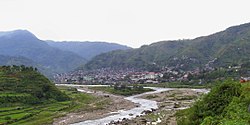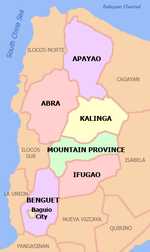Bontoc, Mountain Province
Bontoc | |
|---|---|
 | |
 Location in Mountain Province | |
| Country | Philippines |
| Region | Cordillera Administrative Region (CAR) |
| Province | Mountain Province |
| District | Lone District |
| Founded | 1908 |
| Barangays | 16 |
| Government | |
| • Mayor | Franklin C. Odsey |
| Area | |
| • Total | 396.10 km2 (152.94 sq mi) |
| Population (2010)[3] | |
| • Total | 23,980 |
| • Density | 61/km2 (160/sq mi) |
| Time zone | UTC+8 (PST) |
| ZIP code | 2616 |
| Dialing code | 74 |
| Income class | 2nd class |
| Website | lgubontoc |
Bontoc (Ilocano: Ili ti Bontoc; Pangasinan: Baley na Bontoc; Tagalog: Bayan ng Bontoc) is a second class municipality and the capital of Mountain Province, Philippines. Bontoc is the historical capital of the entire Cordillera region since the inception of governance in the Cordillera. According to the 2010 census, it has a population of 23,980 people.[3] The municipality celebrates annual Lang-ay Festival.
Bontoc is home to the Bontoc Tribe, a feared war-like group of indigenous people who actively indulged in tribal wars with its neighbours until the 1930s. Every Bontoc male had to undergo a rites of passage into manhood, which may include head hunting, where the male has to journey (Sometimes with companions) and hunt for a human head. The Bontocs also used the jaw of the hunted head as a handle for its gongs, and as late as the early 1990s, evidence of this practice can be seen from one of the gongs in Pukisan, Bontoc.
This is the home of the Ifuntok Language, which has variable dialects under it. However, the Original Ifuntok Language is fast dying out, as more of the younger generations speak a mixture of Ilocano, Tagalog, and Kankanaey Dialects. This is partly due to the frequent contact of the younger generations with other regions of the Philippine nation. Some words are not in use anymore. Within the Bontoc proper, only 40% of the local population can communicate using this language without diluting their daily language with other languages/dialects.
History

Samuel E. Kane, American Supervisor and then Governor, established the capital here after the Philippine Commission passed the Mountain Province Act, building a provincial building, hospital, doctor's office, nurse's home, a school, and provincial prison.[4]: 281–284 He also built the Tagudin-Bontoc trail, which by 1926, could accommodate a small car.[4]: 329
This section needs expansion. You can help by adding to it. (December 2015) |
Barangays
Bontoc is politically subdivided into 16 barangays.[2]
Demographics
| Year | Pop. | ±% p.a. |
|---|---|---|
| 1990 | 17,716 | — |
| 1995 | 21,192 | +3.41% |
| 2000 | 22,308 | +1.11% |
| 2007 | 24,798 | +1.47% |
| 2010 | 23,980 | −1.21% |
| Source: National Statistics Office[3] | ||
Economy
The local economy depends largely on small trades and agriculture. This capital town's biggest economic potential is tourism with its smaller rice terraces in Barangay Bay-yo, Maligcong and other areas.
Education
Secondary education
| Name of Institution | Location |
|---|---|
| ALBAGO National High School | Balili |
| Dalican National High School | Dalican |
| Guina-ang National High School | Guina-ang |
| Mountain Province General Comprehensive High School | Poblacion |
| Saint Vincent School | Poblacion |
| Talubin National High School | Talubin |
| Tocucan National High School | Tocucan |
Tertiary education
Mountain Province State Polytechnic College is the first tertiary institution in the municipality that offers various undergraduate & graduate courses. XiJen College of Mountain Province is the only private tertiary institution that also offers technical-vocational courses.
References
- ^ "Official City/Municipal 2013 Election Results". Intramuros, Manila, Philippines: Commission on Elections (COMELEC). 11 September 2013. Retrieved 23 December 2013.
- ^ a b Lua error in Module:Citation/CS1/Date_validation at line 986: bad argument #3 to 'format' (string expected, got nil).
- ^ a b c "Total Population by Province, City, Municipality and Barangay: as of May 1, 2010" (PDF). 2010 Census of Population and Housing. National Statistics Office. Archived from the original (PDF) on 14 November 2013. Retrieved 23 December 2013.
{{cite web}}: Unknown parameter|deadurl=ignored (|url-status=suggested) (help) - ^ a b Kane, S.E., 1933, Thirty Years with the Philippine Head-Hunters, New York: Grosset & Dunlap


